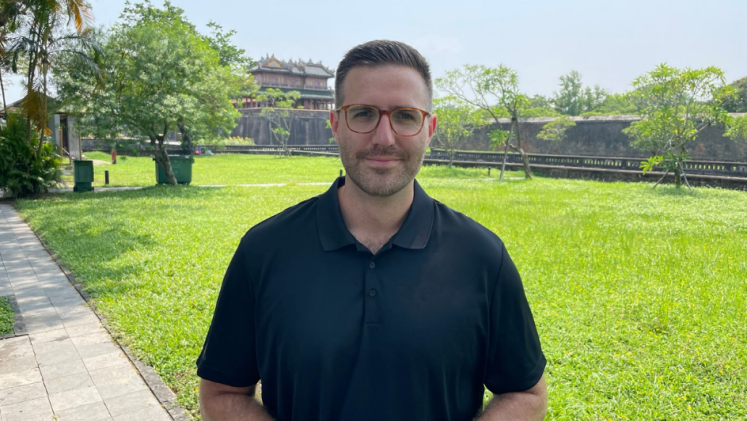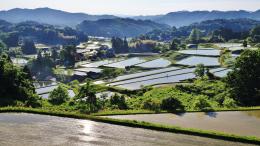Who: Eike Behre, Senior Project Associate & PhD candidate
When: from 14 April – 21 May 2023
Where: Huế, Central Viet Nam
Why: To plan, implement and evaluate ecosystem-based adaptation measures
Eike Behre is a Senior Project Associate at UNU-EHS and member of the Environmental Vulnerability & Ecosystem Services Section (EVES). He is responsible for the overall assessment of adaptation options from the ecosystem service perspective. Eike recently traveled to Central Viet Nam – a region prone to flooding that suffered from severe flood impacts in 2020. In the context of its FloodAdaptVN project, UNU-EHS along with partners from Germany and Viet Nam conducts research to better understand current and future flood risks and identify adaptation options.
What were your objectives for the field mission?
I had three main objectives. The first one was to co-develop a multi-criteria adaptation evaluation catalogue that can be used to evaluate potential adaptation measures including ecosystem-based adaptation options. These criteria can be used to evaluate potential outcomes or impacts of identified measures, before they are implemented. For instance, implementing adaptation options, especially ecosystem-based interventions, should not only reduce flood risks. It will also bring advantages to individuals and communities, such as the encouragement for new businesses or other income opportunities. Other evaluation criteria focus on social acceptance, gender sensitivity or the relevance of driving transformation in the region, for example towards a more “green city” with recreational value. In the end, we identified 36 criteria that were presented to and validated by local stakeholders during a dedicated workshop.
The second objective was understanding ongoing work in the region in relation to ecosystem-based adaptation and flood risk management. In the region and within the city of Huế there are numerous initiatives led by local and international NGOs that also work with ecosystem-based approaches in different contexts, such as coastal dune rehabilitation, mangrove restoration in lagoons or sustainable forest management in mountainous areas. Each of these initiatives has progressed differently and has been able to gather valuable knowledge about planning, implementing and evaluating ecosystem-based approaches. We visited these project sites to learn about challenges and opportunities, but also to identify knowledge gaps and entry points for our research. This exchange was of great value and essential to get a step further in the process of better understanding ecosystem-based approaches.
The third objective is also part of my PhD research, which explores the question of how we can better manage ecosystem services on a landscape level for efficient watershed management and flood risk reduction. When we look at the landscape in our study area, and specifically into the watershed area of the Huong River, we notice that a large extent of the land is characterized by different types of forest management systems, particularly commercial plantation forests. To date, knowledge is scarce on how these different forest plantation systems can impact water management and flood risk reduction. My aim is to model and quantify the water regulating services of these areas in order to prioritize and adapt forest management to the needs of reservoir and downstream flood management.
How do locals perceive ecosystem-based approaches and ecosystem services?
I think people feel and know very well that an intact natural environment is benefiting their well-being. We also know that intact ecosystems within our landscapes can support us in mitigating the impacts of natural hazards, such as flooding or severe precipitation. But in some contexts, we lack the evidence to what extent they can provide these ‘protective’ services. Such evidence is needed to efficiently design and implement ecosystem-based approaches, but also to unlock investments into ecosystem-based solutions or nature conservation and restoration. My research aims to quantify these ecosystem benefits for flood risk management, specifically from an economic perspective. Although the economic valuation of ecosystem services is crucial and necessary for making adaptation investment decisions, we also know that ecosystem-based approaches to adaptation can be much more than an economic benefit, and my research aims to prove that.
What was the most valuable aspect of your field mission?
I think the most valuable aspect of this year’s field mission was the time we had with our local partners and stakeholders. It is important for our work and the success of the project to strengthen relationships and build alliances for future research collaboration. For me, this is the key to the success of our work and research.
Further reading about FloodAdaptVN: “In the field with Dominic Sett: understanding flood impacts and local perception on flood risks and adaptation”, and “5 Considerations for adapting to rising flood risks in urban regions”.





